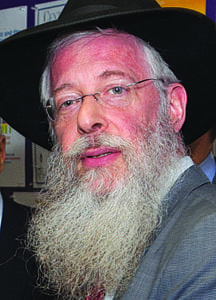At the recent National Jewish Retreat, Prof. Deborah Lipstadt, author of the new book Anti-Semitism: Here and Now, told the old joke about the Jew and Chinese man who were drinking together in a pub. After a few drinks, the Jew shoved the Chinese man, knocking him off his bar stool.
“What was that for?” asked the Chinese man.
“That was for Pearl Harbor,” the Jew said.
“Pearl Harbor? That was the Japanese, not the Chinese!”
“Japanese, Chinese, what’s the difference?”
A few drinks later, the Chinese man shoved the Jew, and knocking him off his bar stool.
“What was that for?” asked the Jew.
“That was for the Titanic,” said the Chinese man.
“The Titanic? The Titanic was hit by an iceberg!”
“Iceberg, Goldberg, what’s the difference?”
Lipstadt explained that this joke demonstrates the absurdity of anti-Semitism. “Iceberg, Goldberg.” It’s cute, but it makes no sense. Because anti-Semitism makes no sense.
There is no rational explanation for anti-Semitism. And, since there is no rational reason for it, there can be no rational solution either. What do you think about this assumption? I have thought it over quite a bit, and I agree.
Historically, there have been two classical responses to anti-Semitism: The first was assimilation.
In the 1930s, being Jewish in Europe was a death sentence. Assimilation was thought to be a simple solution. If there are no Jews, there will be no anti-Semitism.
The other historic response to anti-Semitism was embracing Jewishness, including its historical uniqueness and place in the family of nations. It was called Zionism. Theodore Herzl, the founder of modern Zionism, had a dream of a Jewish state. His dream was not religious, nor was it spiritual. He simply wanted a place to escape from European anti-Semitism.
Working as a journalist, Herzl covered the infamous trial of Capt. Alfred Dreyfus, and was horrified by the anti-Semitism on display. He made the following calculation: “You don’t like Jews in Europe, OK, we will go somewhere else and create our own country. You’ll be happy and we’ll be happy.”
If Herzl could see the miracle of Israel today, and witness with great pride, the amazing manifestation of his life’s dream, would he now be able to say that Israel has achieved his stated purpose of stopping anti-Semitism? Of course, the answer is a resounding no!
So what should be our response? The Lubavitcher Rebbe addressed anti-Semitism as follows: “At a time of added darkness, we need to each be ambassadors of light. The only antidote to the darkness of anti-Semitism is to create more light. For even a small light can dispel much darkness.” Most of our complaining of anti-Semitism just causes frustration. Let’s focus instead on being proud Jews. Let’s focus less on the evils of the world and work together more to spread goodness and kindness.
Of course, we need to lobby governments to outlaw expressions of anti-Semitism. We need organizations such as the Anti-Defamation League to defend our civil rights. For the average person, though, the best way to fight the darkness is to shine a light. The most effective way to combat evil is by spreading goodness.
Rabbi Abaham Isaac Kook, the chief rabbi of British Mandate Palestine, once said: “The righteous do not complain of the dark; rather, they work to increase the light; they do not complain of evil, but they increase justice; and they do not complain of ignorance, rather, they increase wisdom.”
Let’s add one more light, one more good deed, one more hour of Torah study and one more act of goodness and kindness. Together, we will end the hate, spread the light and usher in the age of moshiach when goodness and G-dliness will reign supreme.
Rabbi Avrohom Litvin is regional director of Chabad of Kentucky.




